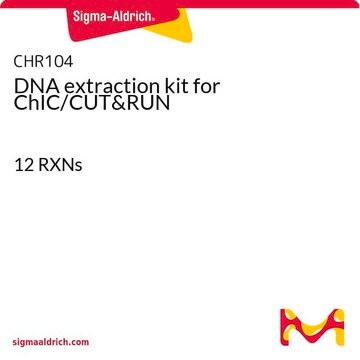11696505001
Roche
Agarose Gel DNA Extraction Kit
kit of for up to 100 reactions
Sinônimo(s):
agarose
Faça loginpara ver os preços organizacionais e de contrato
About This Item
Código UNSPSC:
41105500
Produtos recomendados
Descrição geral
By combining agarose gel electrophoresis and extraction, you can easily concentrate dilute, aqueous DNA solutions. After processing with the kit, the DNA can be recovered in a volume of 20 to 50 μL. Isolated DNA fragments are free of inhibitors that could affect common downstream procedures. For example, recovered DNA can be efficiently ligated into cloning vectors or labeled to high specific activity. Restriction digests proceed without inhibition.
For the elution of DNA fragments from agarose gels.
The Agarose Gel DNA Extraction Kit provides convenient isolation of high-quality DNA in large amounts.
The Agarose Gel DNA Extraction Kit provides convenient isolation of high-quality DNA in large amounts.
Aplicação
Agarose Gel DNA Extraction Kit has been used to extract full-length (CHRNA_v2) and shortest (CHRNA_v3) amplicons from agarose gels.
The Agarose DNA Extraction Kit efficiently isolates both small and large DNA fragments from standard or low melting point agarose. Recovered DNA fragments are suitable for:
- Ligation and transformation
- Enzymatic restriction
- Random primed or nick translation labeling methods
- Sequencing
- PCR/long PCR
- Cloning
- Concentrate dilute nucleic acid solutions
Características e benefícios
- Quick and simple.
- Combine with different agaroses and buffer systems.
- Purify efficiently.
- Isolate large DNA fragments without shearing.
- Isolate oligonucleotides >=20 bp.
- Avoid enzymatic inhibition.
Componentes
- Silica Matrix, for 100 standard reactions
- Solubilization Buffer
- Nucleic Acid Binding Buffer
- Wash Buffer
Qualidade
DNA Molecular Weight Marker II is separated in a 0.8% agarose gel and the 546-, 2,322-, and 6,557 bp fragments are isolated with the kit components. The expected amount of DNA is recovered for each fragment. Depending on parameters such as fragment length, preparation, and purity of the applied DNA, up to 80% recovery is achieved. DNA fragments are digested with restriction enzymes. No inhibition of DNA digestion is observed.
Nota de preparo
A solubilization buffer containing a chaotropic salt (sodium perchlorate) dissolves an agarose gel slice that contains a DNA fragment. In the presence of the chaotropic salt, the DNA fragment binds selectively to silica matrix. The DNA remains bound while a series of rapid wash-and-spin steps remove contaminating small molecules. Finally, low-salt elution removes the DNA from the silica matrix. The process does not require DNA precipitation, organic solvent extractions, or extensive handling of the DNA.
Outras notas
For life science research only. Not for use in diagnostic procedures.
Palavra indicadora
Danger
Frases de perigo
Declarações de precaução
Classificações de perigo
Acute Tox. 4 - Eye Irrit. 2 - Ox. Liq. 1 Oral - STOT RE 2
Código de classe de armazenamento
5.1A - Strongly oxidizing hazardous materials
Classe de risco de água (WGK)
WGK 1
Ponto de fulgor (°F)
does not flash
Ponto de fulgor (°C)
does not flash
Certificados de análise (COA)
Busque Certificados de análise (COA) digitando o Número do Lote do produto. Os números de lote e remessa podem ser encontrados no rótulo de um produto após a palavra “Lot” ou “Batch”.
Já possui este produto?
Encontre a documentação dos produtos que você adquiriu recentemente na biblioteca de documentos.
Os clientes também visualizaram
Cholinergic Receptor Nicotinic Alpha 5 (CHRNA5) RNAi is associated with cell cycle inhibition, apoptosis, DNA damage response and drug sensitivity in breast cancer
Koker SC, et al.
PLoS ONE, 13(12), e0208982-e0208982 (2018)
Zhongchun Tong et al.
Experimental and therapeutic medicine, 14(6), 5491-5496 (2017-12-30)
A high prevalence of Enterococcus faecalis (E. faecalis) is observed in teeth with root canal treatment failures. Clustered regularly interspaced short palindromic repeats (CRISPR) are widely distributed in prokaryotes that have adaptive immune systems against mobile elements, including pathogenic genes.
Joris van Arensbergen et al.
Nature biotechnology, 35(2), 145-153 (2016-12-27)
Previous methods to systematically characterize sequence-intrinsic activity of promoters have been limited by relatively low throughput and the length of the sequences that could be tested. Here we present 'survey of regulatory elements' (SuRE), a method that assays more than
Nossa equipe de cientistas tem experiência em todas as áreas de pesquisa, incluindo Life Sciences, ciência de materiais, síntese química, cromatografia, química analítica e muitas outras.
Entre em contato com a assistência técnica









